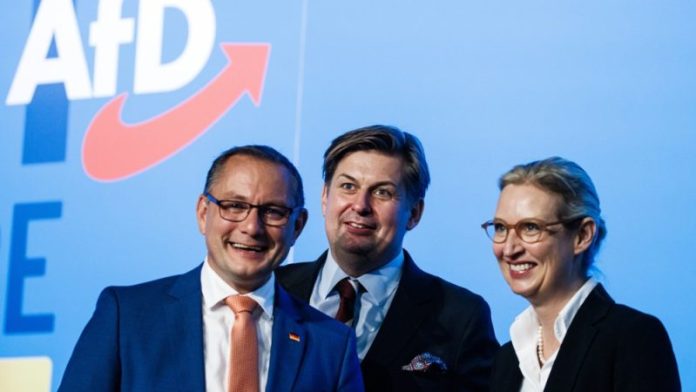European far-right political forces have reached record levels just months before the EU elections, Euractiv reports.
If the EU elections were held today, far-right anti-EU parties united in the EU parliament under the umbrella of the Identity and Democracy (ID) group would win 87 of the 705 seats (they currently hold 60), a new poll by Europe Elects shows.
ID includes parties such as Marine Le Pen’s nationalist Rassemblement Nationale (RN), which is leading in the polls in France; the far-right Alternative for Germany (AfD) party, which is second in German elections; and Matteo Salvini’s Lega, which is already a coalition partner in Italy. Europe Elects reports that the ID group’s recent successes were partly due to the surprise victory of Geert Wilders’ far-right PVV party in last week’s Dutch elections.
The situation is similar for Austria’s far right, known as the FPÖ, which has been consistently leading in the polls in Vienna.
With a significant electoral boost, ID is expected to overtake the conservative group European Conservatives and Reformists (ECR) to become the fourth largest force in the EU House of Representatives. Europe Elects commented:
In total, about 23% of the seats would go to the two groups of the radical right in the EU Parliament, as per the current projection […] This does not include radical right parties that are not affiliated with the two groups, like the Hungarian Fidesz, which sits with the ideologically diverse Non-Inscrits (NI) in the EU Parliament.
The extreme right-wing political forces in Europe are changing their rhetoric step by step, prioritising in their public speeches the need to change the EU instead of insisting on leaving the EU. According to Europe Elects, this element may help them break tradition and mobilise voters ahead of the elections.
Indeed, after the Dutch elections, Marine Le Pen strongly criticised the EU institutions. She said they needed a complete overhaul and specified that Europe should not fall apart and France should keep the euro currency.
Polls show that the Greens are suffering an electoral collapse: their number will drop from 72 to 52 seats. The situation is similar for the liberal group Renewal, which currently holds 101 seats and is expected to drop to 89.
The centre-right European People’s Party (EPP) remains the main political force in the EU. It is aiming for 175 seats, just three less than it has now. The socialist S&D will retain 141 seats.
Based on the poll results, a pro-European grand coalition between the EPP, S&D and the Liberals seems a likely scenario. Immediately after the summer, tensions between the EU centre-right and centre-left escalated after public disagreements on several policy issues, such as the vote on the EU’s nature restoration law and the air pollution directive.
Both parties have exchanged sharp accusations over their stance on the EU’s green policies in general, and also spread rumours that the EPP was seeking a coalition with extreme right-wing forces. But after the EPP general secretary’s interview with Euractiv at the end of September, the situation seems to have been resolved. Thanasis Bakolas of the EPP ruled out the possibility of co-operation between the EPP and ECR or ID. He claimed:
I think the EPP, the Socialists, ALDE [liberals], and the Greens are political elements within the EU that have guaranteed our Union is moving forward in the right direction.
